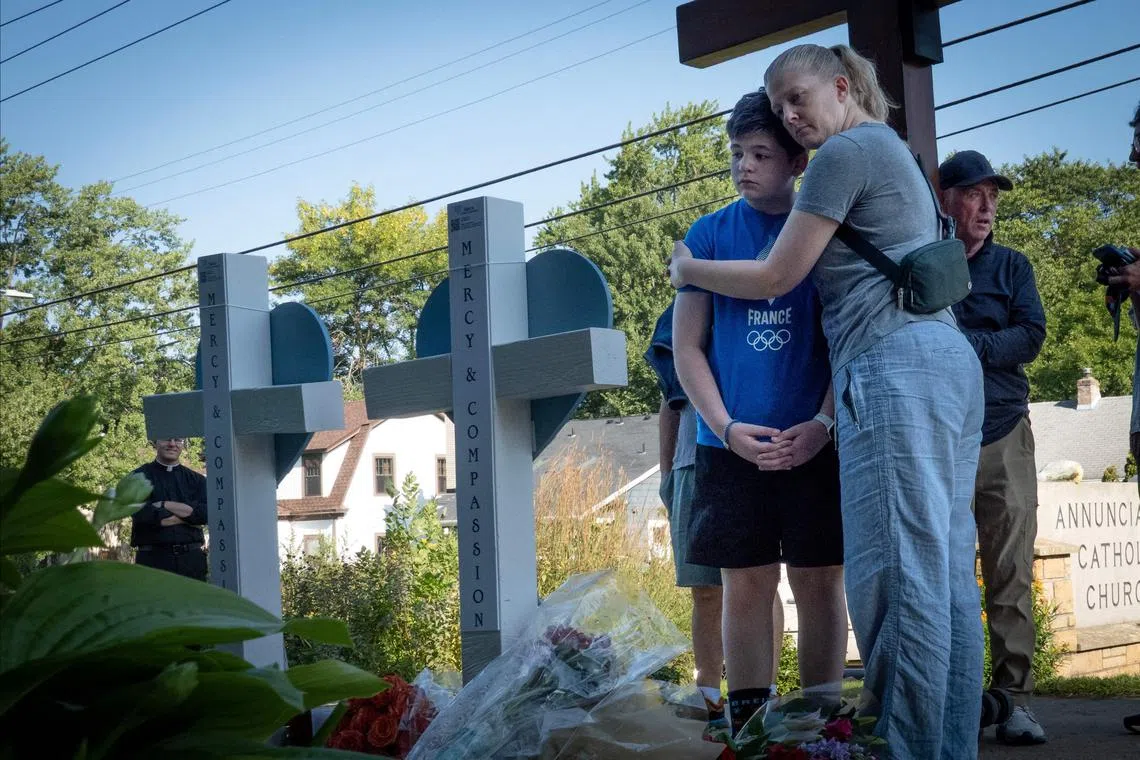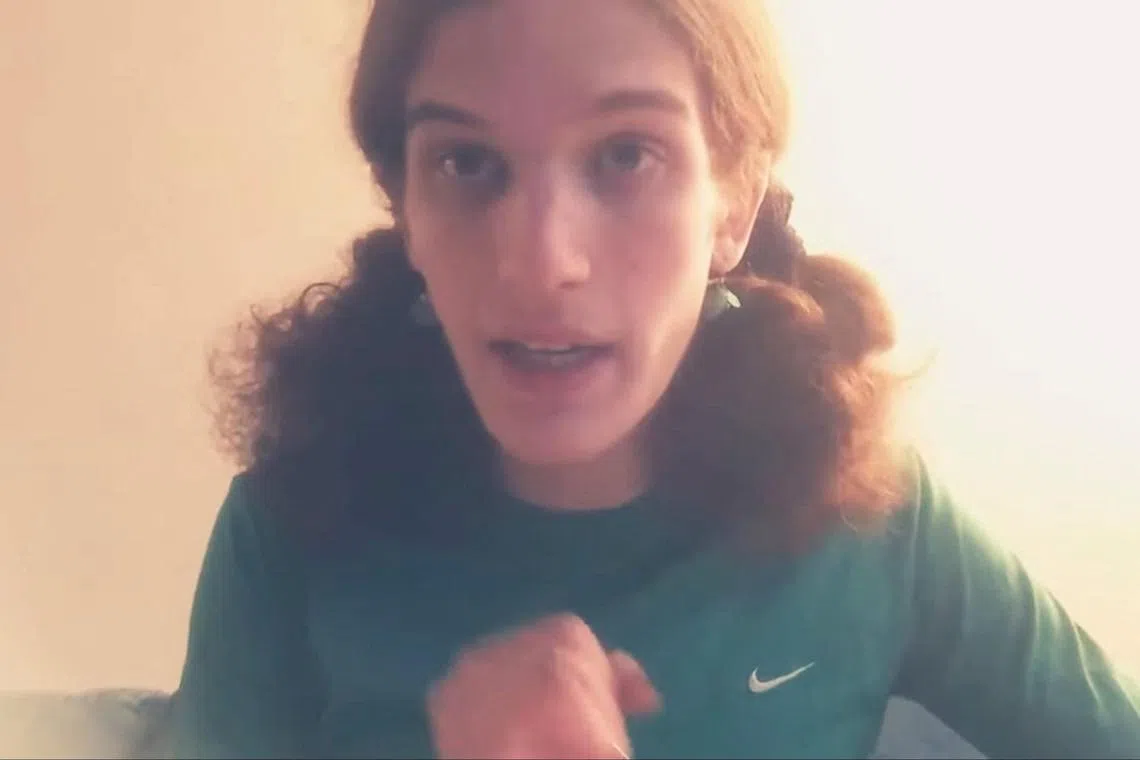Minneapolis children revealed courage, experienced trauma during church shooting
Sign up now: Get ST's newsletters delivered to your inbox

People visiting a memorial to victims of the Annunciation Catholic Church shooting in Minneapolis, on Aug 28.
PHOTO: AFP
- Minneapolis church shooting: A shooter killed two children and injured 18 at a Catholic Mass for students celebrating the new school year.
- Courage Under Fire: Students and teachers protected others during the attack. Eighth-grader Javen Willis helped keep his classmates calm and safe.
- Shooter's motive and reaction: Robin Westman, 23, cited anger, depression, and lung cancer fears in a video. The incident reignites the gun control debate.
AI generated
MINNEAPOLIS - Some children and teachers inside a Minneapolis church displayed remarkable courage under fire when an assailant began shooting at students attending a Catholic mass, medical officials said on Aug 28.
One pre-teen student at Annunciation Catholic Church during the deadly Aug 27 morning attack
“There are a lot of maybe unrecognised heroes in this event, along with the children who were protecting other children,” said Mr Martin Scheerer, a director at Hennepin Emergency Medical Services. “The teachers were getting shot at. They were protecting the kids.”
The shooter killed two children before dying of a self-inflicted gunshot wound, and 18 teachers and children were injured, including a child taken to hospital in critical condition.
In the US, deadly gun violence has become increasingly commonplace at schools, churches and other settings once considered safe, despite efforts to beef up security and identify potential perpetrators before they can act.
The shooter, armed with a rifle, a pistol and a shotgun, fired through the stained glass windows of the church at students from an affiliated school, sitting in pews for a service to celebrate the start of the new school year.
Chloe Francoual, 11, was among the pupils of Annunciation Catholic School who were terrified and traumatised by the flying bullets and shattered glass.
“She thought she was going to die with her friends,” her father, Mr Vincent Francoual, said in an interview.
After father and daughter were reunited in the school gym after the attack, the pair burst into tears, he said.
Later at home, Chloe wanted all the doors in the house locked and the curtains drawn, and implored her father not to walk the dog for fear of dangers outside.
“She’s just a little girl,” her father said. “She’s feeling all this guilt that she is okay, but her friends aren’t.”
Concern for survivors and witnesses of such violence extends beyond their physical well-being, experts say.
They often experience a range of symptoms in the first few weeks after the event, according to Dr Gail Saltz, a psychiatrist and clinical associate professor of psychiatry at the New York-Presbyterian Hospital and Weill Cornell Medical College.
As part of an “acute stress reaction”, they may be easily startled, have trouble sleeping or experience a temporary regression of developmental steps they have already made, such as a return to bed-wetting, Dr Saltz said.
They may struggle with separation or fear being alone.
“It is important in those early days of a child having symptoms that they are getting support and potentially counselling, to attend to those individual symptoms, to let them be able to talk about what they’re feeling and what they’re thinking about, and how to process that,” Dr Saltz said.
Eighth-grader Javen Willis, 13, told NBC News that he knew “something was off” the moment he heard shots ringing out. Javen, who was not injured, recalled thinking: “I want to try to keep everyone as safe as possible.”
He said he told two friends to get under the pews. While he was under the pews, he prayed and told himself that with “God on my side, I would be fine”.
“So I tried to just go and help out my fellow classmates, keep them calm and safe and let them know they would be okay,” he said.
The shooter, identified as Robin Westman, 23, shared a suicide note in a video posted to YouTube in which she said she was convinced she was dying of lung cancer caused by a vaping habit and was struggling with anger and depression. She also made reference to other deadly school shootings in the US.
According to court papers, when the shooter was 17, she identified as female and legally changed her name to Robin from Robert.

Gunman Robin Westman killed two children before dying of a self-inflicted gunshot wound.
PHOTO: REUTERS
Each new attack stirs a long-running national debate over the causes: easy access to guns versus treatment of mental illness.
Minneapolis Mayor Jacob Frey, a Democrat, said this mass shooting showed a need for tighter gun regulation, a politically tough endeavour after a 2008 US Supreme Court ruling that reaffirmed the individual’s right to own guns.
The mayor took issue with the view of many conservatives who say the prevalence of gun violence in the US is a mental health issue, unrelated to access to firearms.
“People who say, ‘This is not about guns’, you’re kidding me: This is about guns,” Mr Frey said in an interview with ABC News. “People obviously who have these severe mental health issues should not have access to guns. Yet this particular individual had access to a heap ton of them.”
Mr Francoual, who is a chef, said his daughter Chloe wants to move to her father’s native France now. In Europe, he noted, you can get a gun for hunting, but “you can’t just walk into a store and get these weapons”.
“We have crazy people all over the world, but not these weapons,” he said. REUTERS


